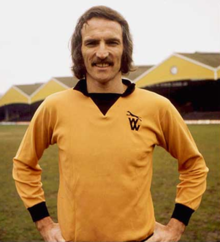 Dougan as a Wolverhampton Wanderers player | |||
| Personal information | |||
|---|---|---|---|
| Full name | Alexander Derek Dougan | ||
| Date of birth | 20 January 1938 | ||
| Place of birth | Belfast, Northern Ireland | ||
| Date of death | 24 June 2007 (aged 69) | ||
| Place of death | Wolverhampton, England | ||
| Height | 6 ft 3 in (1.91 m) | ||
| Position(s) | Forward | ||
| Youth career | |||
| 1951–1953 | Cregagh Boys | ||
| Senior career* | |||
| Years | Team | Apps | (Gls) |
| 1953–1957 | Distillery | 76 | (17) |
| 1957–1959 | Portsmouth | 33 | (9) |
| 1959–1961 | Blackburn Rovers | 59 | (26) |
| 1961–1963 | Aston Villa | 51 | (19) |
| 1963–1965 | Peterborough United | 77 | (38) |
| 1965–1967 | Leicester City | 68 | (35) |
| 1967–1975 | Wolverhampton Wanderers | 258 | (95) |
| 1967 | → Los Angeles Wolves (loan) | 11 | (3) |
| 1969 | → Kansas City Spurs (loan) | 6 | (4) |
| 1975–1977 | Kettering Town | ||
| Total | 639 | (246) | |
| International career | |||
| 1952 | Northern Ireland Schoolboys | 3 | (0) |
| Northern Ireland Youth | |||
| 1956 | Northern Ireland Amateurs | 2 | (0) |
| 1957–1959 | Northern Ireland B | 2 | (3) |
| 1958–1973 | Northern Ireland | 43 | (8) |
| Managerial career | |||
| 1975–1977 | Kettering Town (player-manager) | ||
| *Club domestic league appearances and goals | |||
Alexander Derek Dougan (20 January 1938 – 24 June 2007) was a Northern Ireland international footballer, football manager, football chairman, pundit, and writer. He was also known by his nickname, "The Doog".[1][2] He was capped by Northern Ireland at schoolboy, youth, Amateur, and 'B' team level, before he won 43 caps in a 15-year career for the senior team from 1958 to 1973, scoring eight international goals and featuring in the 1958 FIFA World Cup. He also played in the Shamrock Rovers XI v Brazil exhibition match in July 1973, which he also helped to organise.
A strong and physical forward, he began his career at Distillery in his native Belfast. He helped Distillery to win the Irish Cup in 1956, before he won a £4,000 move to English First Division side Portsmouth in August 1957. He was sold on to Blackburn Rovers in March 1959 for a fee of £15,000 and played for the club in the 1960 FA Cup Final despite handing in a transfer request the day before the final. He moved on to Aston Villa for £15,000 in July 1961 but struggled with injuries during a two-season stay at Villa Park. He dropped into the Third Division to join Peterborough United in 1963, who paid a £21,000 transfer fee. He returned to the top flight in November 1965 after being sold to Leicester City for £26,000. He was sold to Wolverhampton Wanderers for a £50,000 fee in March 1967 and helped the club to win promotion out of the Second Division in 1966–67, to lift the Texaco Cup in 1970 and the League Cup in 1974, and also played on the losing side of the 1972 UEFA Cup final. He also spent two summers in the United States playing for the club's sister teams, the Los Angeles Wolves and the Kansas City Spurs, who he helped to win the United Soccer Association and NASL International Cup respectively. He retired in 1975, scoring 279 goals in 661 league and cup appearances across 18 seasons in the Football League.
He was appointed player-manager at Southern League Premier Division side Kettering Town in 1975, a position he retained for two years. He negotiated the first shirt sponsorship deal in English football at the club. He chaired the Professional Footballers' Association (PFA) from 1970 to 1978, and helped to further players' rights and set up the first PFA player awards in 1974. Also, throughout the 1970s, he became a football pundit and writer and became particularly well known for his part in ITV's coverage of the 1970 and 1974 FIFA World Cup. After fronting a consortium that took Wolverhampton Wanderers out of liquidation, he served the club as chairman from August 1982 to January 1985. He stood as an independent politician in the Belfast East constituency in 1997 and later became involved in the UK Independence Party.
- ^ Scott, Ged (25 June 2007). "Football: Colourful life and times of Wolves hero Dougan; DEREK DOUGAN APPRECIATION. – Free Online Library". The Birmingham Post. Retrieved 27 July 2016.
- ^ "OBITUARY: Derek Dougan. – Free Online Library". Daily Post. 26 June 2007. Retrieved 27 July 2016.